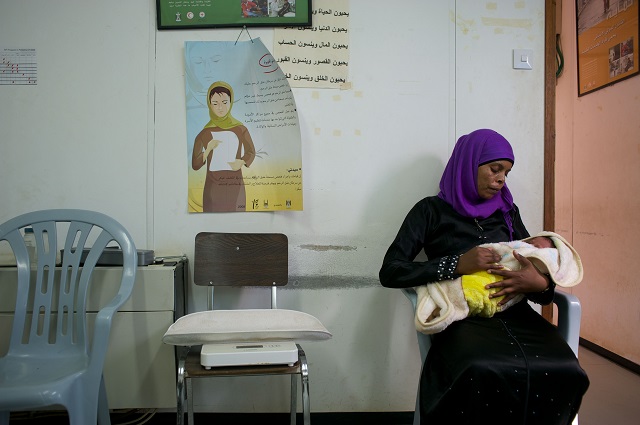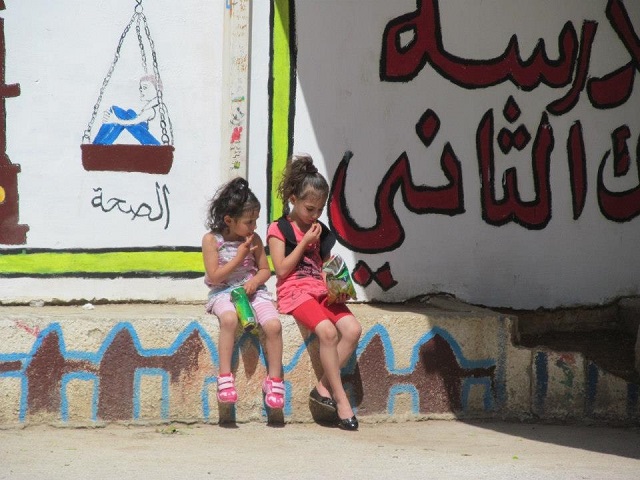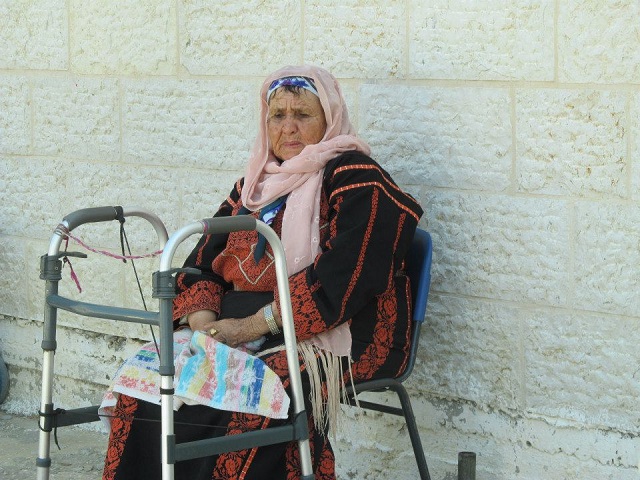Systemic racism is a public health threat, just ask Palestinians Special Report
Features, New in Ceasefire, Special Reports - Posted on Thursday, September 17, 2020 11:43 - 0 Comments
By Rasha Kaloti

October 17, 2010. A Palestinian mother brings her new-born baby to a Palestine Red Crescent medical clinic in Al-Jiftlik, Jordan Valley. Restrictions on the construction and development of public infrastructure force thousands of residents in Al Jiftlik to rely on this small health clinic. (Credit: Alessio Romenzi/International Committee of the Red Cross)
The killing of George Floyd by police in the city of Minneapolis, Minnesota on 25 May 2020, has sparked increased discussion of racism as it is experienced through institutionalised discrimination. Meanwhile, the COVID-19 pandemic has proven to affect people disproportionately, with systemic inequalities worldwide putting racial and ethnic minority groups at a greater risk of infection and death.
Settler colonialism and apartheid are two forms of deep-rooted and all-encompassing racist systems that operate on the basis of “oppressor and oppressed”, and which impact people’s livelihoods and their health. Evidence shows that racial and ethnic minority groups living under these systems experience systematic discrimination and suffer from worse health outcomes than more advantaged groups. As a Palestinian who has lived under Israeli occupation, I have witnessed first-hand the effects of Israel’s apartheid system on the health of Palestinians.
Israel as an apartheid state
For decades, going all the way back to the Nakba of 1948, Palestinians have experienced settler colonialism and apartheid at the hands of Israeli authorities. From second-class citizenship to direct military rule, Palestinians’ reality has included expulsions, land confiscation, segregation, movement restrictions, violent repression, and military detention.
Just by way of an example, note that over the past two decades, Israel approved just 3.7% of Palestinian building permits within an area amounting to two-thirds of the occupied West Bank. Another example: in 2018, Israel passed the Jewish Nation-State Law, “which decrees that self-determination in this land belongs solely to Jews”.
Palestinians have long understood Israeli policies as a form of apartheid – and international human rights experts have similarly reported on institutionalised racism in ‘land development’, along with wide-ranging ‘discriminatory legislation’ and ‘segregation’. Israeli human rights groups similarly describe Israeli state policy in terms of “the crime against humanity of apartheid”.
Israeli apartheid affects the health of Palestinians in a number of ways, including through the colonisation of land and natural resources, the impairment of access to healthcare, as well as the direct impact of institutionalised discrimination on mental health.

A mobile clinic run by Physicians for Human Rights in the west bank village of Deir Ibze, Ramallah, April 27, 2013. Physicians for Human Rights-Israel run a mobile clinic that operates every Saturday in a different Palestinian village in the west bank. (Photos by Raoof Daud & Salah Haj Yahya, licensed under Creative Commons).
Colonisation of land and natural resources
The annexation and discriminatory confiscation of Palestinian land for the purpose of expanding Israeli settlements – illegal under international law – continues unabated as we speak. This includes the confiscation of large areas of Palestinian farm land, contributing to increased food insecurity in Palestine. About 68.5% of the population in Gaza, and nearly 1.6 million Palestinians in the West Bank and Gaza, suffer from food insecurity.
Israel’s control over resources and its effect on local businesses is deepening the level of poverty in Palestine, which currently affects 53% of the population in Gaza, 17% in the West Bank and 76% in East Jerusalem. Poverty and food insecurity affect Palestinians’ ability to access nutritious foods including fruits and vegetables, increasing their risk of non-communicable diseases, such as diabetes, heart disease and cancer. Palestinians suffer from high levels of these illnesses, which represent the biggest causes of death in Palestine.
Israel controls all of the water resources in Palestine, severely limiting the Palestinian population’s access to clean drinking water while Israeli areas and illegal settlements enjoy developed water infrastructure and unlimited access to water. On average, Palestinians consume 73 litres of water per day. This is less than the World Health Organization’s recommendation of at least 100 litres per day, and a quarter of the average Israeli water daily consumption of 300 litres.
Additionally, water quality in Palestine is poor. For example, 96% of the water in Gaza is unfit for human consumption. This makes Palestinians more prone to water-borne diseases, such as typhoid fever, hepatitis A, kidney disease and acute diarrhoea, and is now seriously affecting their ability to carry out preventative hygiene measures against the COVID-19 pandemic.
Lack of access to healthcare facilities
The lack of available healthcare facilities affects Palestinians’ access to healthcare. In Area C, there is no single permanent healthcare centre due to building restrictions by Israel. Meanwhile, Israeli settlers (again, illegal under international law) in that same area have access to fully developed health facilities. In Jerusalem, the Israeli municipality runs only six family health centres in Palestinian neighbourhoods, as opposed to 27 in Israeli ones.
The separation of Palestinian areas, the Israeli siege on Gaza, and the severe limitations on the movement of Palestinians all cause detrimental health effects. Israel’s tight border control has impaired the transport of medications, medical equipment, personal protective equipment to and from the West Bank and the Gaza Strip.
In 2018, Israeli authorities approved only 61% of travel permit applications for Palestinian patients from Gaza who required referrals to hospitals in the West Bank or Israel. The majority of these applications were for cancer treatment. According to the WHO, patients from Gaza that were delayed or denied permits for cancer chemotherapy and/or radiotherapy from 2015 to 2017 were almost 1.5 times more likely to die from cancer.
More recently, Palestinian efforts to curb the effects of COVID-19 have been crippled by the Israeli occupation. Last month, Israeli forces destroyed a COVID-19 testing clinic in Hebron and confiscated clinic tents in the Jordan Valley intended for the response to the pandemic. Additionally, there has been a delayed response to the pandemic by Israeli authorities in East Jerusalem, and a lack of testing clinics as well as limited or no data on COVID-19 cases in East Jerusalem. Israeli occupying forces have been routinely and systematically arresting Palestinians who volunteer to raise awareness of the pandemic without any form of justification.

A Palestinian woman waits outside the Mobile Clinic for Woman, Deir Ibze, West Bank, 27/4/13 (Photos by Raoof Daud & Salah Haj Yahya, licensed under Creative Commons).
Mental health consequences
Palestinians suffer from poor mental health due to the dire living conditions resulting from the occupation. One study showed that around 40-50% of youth in the West Bank and Gaza suffer from anxiety, while 28-30% suffer from depression. Samah Jabr, a psychiatrist and psychotherapist at the Palestinian Ministry of Health, describes the mental health situation under occupation thus: “the psychological suffering and collective anxiety are pandemics that affect every Palestinian family”.
As a result of decades of Israeli attacks and violence against Palestinian populations, Post-Traumatic Stress Disorder (PTSD) is common among children and adults in Palestine. One study shows that 88.4% of children and adolescents in Gaza have experienced trauma in their life, while 53.5% suffered from PTSD. The study showed that children who had experienced trauma, witnessed the trauma of others and the demolition of property were significantly more likely to suffer from PTSD.
According to a WHO report, the psychological effects of Israeli demolitions and forced evictions of Palestinians in Jerusalem hit women the hardest. The report also states that a high percentage of the Palestinian male population has spent some time in confinement, causing severe and long-term mental health effects on them and their families. Children who are detained experience chronic stress and traumatic experiences including intense fear, helplessness and loneliness.
According to Al Mezan Centre for Human rights, Israel’s ongoing 13-year-long siege on Gaza and its de-development policies have resulted in high unemployment rates, food insecurity and poverty. This has had a severe mental health impact on the Gazan population. At least 16 suicide cases were reported in Gaza since the start of this year alone.
Racism is a public health threat
The Israeli colonial and apartheid system’s discriminatory measures against Palestinians presents a serious public health threat: It has increased the risk of disease, restricted accessibility to healthcare facilities, and damaged the mental health and wellbeing of Palestinians. As the predicament of Palestinians shows, racism is a major public health threat that affects disadvantaged groups worldwide, and should be addressed as one of the main social and political determinants of health.



Leave a Reply